
- Poems Poetry Art
- Author
- Alfred French (11)
- Charles Bukowski (12)
- Clarence F Underwood (6)
- Edgar Allan Poe (16)
- Edmund Spenser (7)
- Eyvind Earle (15)
- Jack Hirschman (16)
- John Hejduk (9)
- John Milton (7)
- Lance Woolaver (7)
- Lindley Murray (8)
- Patti Smith (16)
- Reilly Rhodes (11)
- Rosaleen Norton (6)
- Shel Silverstein (9)
- Unknown (9)
- Various (40)
- William Blake (9)
- William Shakespeare (7)
- Wulf Segebrecht (17)
- ... (3209)
- Binding
- Language
- Arabic (3)
- Czech & English (11)
- Dutch (5)
- Eng, Gec (3)
- English (1340)
- English, Japanese (3)
- English, Persian (3)
- English, Russian (9)
- French (43)
- Germ, German (4)
- German (45)
- German, Germ (12)
- Hebrew (3)
- Italian (11)
- Japanese (18)
- Latin (11)
- Persian (7)
- Portuguese (3)
- Russian (19)
- Spanish (13)
- ... (1881)
- Publisher
- Abrams, Inc. (12)
- Bernard Lintott (6)
- Brill (6)
- Broadside Press (10)
- De Selliers, Diane (10)
- E. Little & Co (8)
- George Olms (16)
- Gotham Press (9)
- Hard Press (15)
- Harpercollins (7)
- J.b. Metzlersche (17)
- Museum Of Modern Art (9)
- Nimbus Publishing (7)
- Rizzoli (9)
- Samuel French (7)
- Sore Dover Press (7)
- Ten Crow Press (6)
- Thames & Hudson (6)
- Unknown (11)
- X-ray Book Company (6)
- ... (3263)
- Region
- Signed
Japanese Woodblock Print Poem 78-11-B (Head) by Maki Haku (19242000) (NoN)
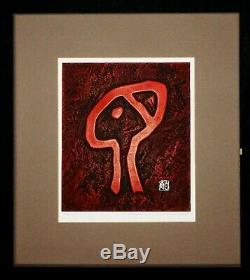
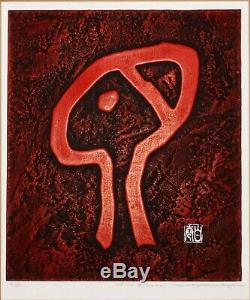
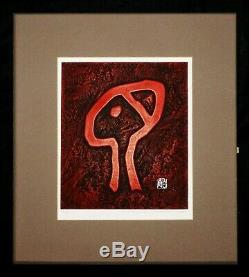
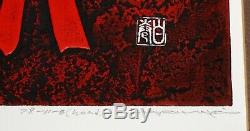
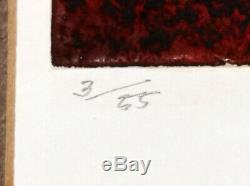
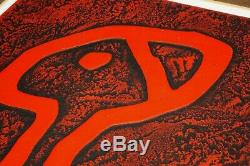
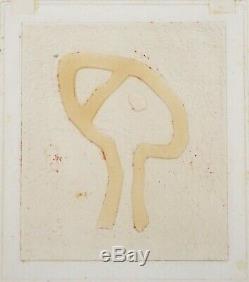


The condition is described above for more information please check the photos. Print 9 inches x 7.75 inches. Mat 15.5 inches x 14 inches. Maki Haku (, 19242000) is the artistic name of Maejima Tadaaki, who was born in Ibaraki Prefecture. He was a ssaku-hanga artist in 20th Century Japan.
[1] During World War II, Maejima Tadaaki was trained as a kamikaze pilot in the Japanese air force, but the war ended before he was assigned a mission. [2] Haku had no formal art training, but studied for two years with the ssaku-hanga artist Onchi Kshir (18911955). Two unique qualities of Maki Haku prints are the textures achieved by working the designs in wet cement and the use of Kanji (Chinese characters) as design motifs. [4] In 1962, he started adding texture to his prints. At first, he added texture to the entire sheet after it was printed.In 1965, he began embossing designs into unprinted paper by using a press to transfer a design created in cement on a carved plywood board, and then adding color with stencils. [5][6] He distorted and rearranged the strokes of Chinese characters to produce striking and serene images.
For example, Poem 71-91 is a highly stylized representation of the kanji , which is pronounced mu and means nothingness, an important concept in some forms of Buddhism. The artist participated in the Tokyo International Print Biennale in 1957 and 1960. The book Festive Wine: Ancient Japanese Poems from the Kinkafu is a translation of 21 ancient poems called Kinkafu or Music for Wagon Songs. The translation is accompanied by Maki Haku's prints that were made in 196869. The Art Institute of Chicago, the Cincinnati Art Museum, the Honolulu Museum of Art, the Los Angeles County Museum of Art, the Museum of Fine Arts, Boston, the Museum of Modern Art (New York), and the Philadelphia Museum of Art are among the public collections holding prints by Haku Maki[7]. It is important to know when purchasing items that. Please keep this in mind. As your ratings have immediate discount or listing-standing consequences for me. For all packing materials used. And everything has to be. To give you an idea, a. If it is not a free one from the Post Office, costs between. And I usually use at least 3 or 4 feet or more for breakable items.Per box (book box size) will be between. The item "Japanese Woodblock Print Poem 78-11-B (Head) by Maki Haku (19242000) (NoN)" is in sale since Sunday, August 18, 2019. This item is in the category "Art\Art Prints". The seller is "andresharnischbrokerageinc" and is located in Honolulu, Hawaii. This item can be shipped worldwide.
- Size: Small (up to 12in.)
- Artist: Maki Haku (19242000)
- Style: Asian
- Listed By: Dealer or Reseller
- Printing Technique: Block
- Quantity Type: Multi-Piece Work
- Medium: Woodcut & Block
- Date of Creation: 2000-Now
- Year: unknown
- Features: Matted
- Width (Inches): 7.75
- Color: Red & Black
- Subject: Figures
- Originality: Limited Edition Print
- Height (Inches): 9
- Print Surface: Paper

